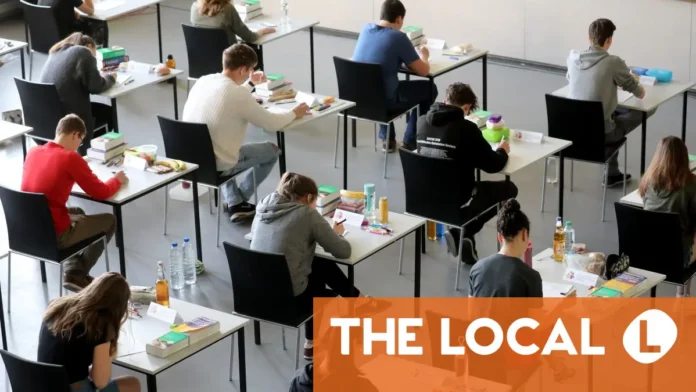Student performance in German schools is in steep decline as a new generation of students grapples with the aftermath of the Covid pandemic and other shocks. How big is the problem, and what are the plans for improvement?
A new national study – the IQB Education Trend 2024 – revealed alarming declines in mathematics and natural science performance among German ninth graders, typically 14 and 15-year-olds.
According to the independent Institute for Quality Development in Education (IQB), one in three students now fails to meet the minimum competency level in maths required for the intermediate school certificate.
Similar shortcomings were recorded in chemistry, physics, and biology.
The results mean that today’s ninth graders are on average about one year behind in their academic development, compared with ninth graders surveyed in 2018.
Ministers sound the alarm
Education ministers across Germany appeared deeply concerned by the study’s findings.
According to reporting by Tagesspiegel, the Conference of Education Ministers (KMK) even considered postponing the report’s release amid “hectic meetings” before ultimately deciding to confront the “unprecedented drop” declared by IQB Director Petra Stanat.
Simone Oldenburg, president of the KMK and education minister for Mecklenburg-Western Pomerania, said the results show, “clearly where we stand – and where we urgently need to improve”, at the conference in Berlin on Thursday.
The study measured 24 fewer competency points in mathematics, biology, chemistry, and physics compared to 2018, equating to a learning gap of about one school year.
Federal Minister for Education Karin Prien underlined the seriousness of the issue, acknowledging that, “Schools alone will no longer be able to solve these major challenges.”
Prien emphasised that addressing the crisis requires collaboration across politics, administration, schools, families, and beyond.
READ ALSO: The things they don’t tell you about raising kids in Germany
What does the study reveal?
The IQB Education Trend tested over 48,000 ninth-grade students from all 16 German states to assess whether they met educational standards. These standards are set by the Conference of Education Ministers and outline the minimum competencies students should attain by the end of certain educational stages.
Advertisement
The results were dramatic. Approximately 24 percent of students failed to meet the minimum standard in mathematics needed for the intermediate school leaving certificate (MSA); 25 percent missed the mark in chemistry, 16 percent in physics, and 10 percent in biology.
Only 42 percent achieved the standard level expected in maths, with similarly low proportions in science subjects.
Notably, the decline has accelerated since the last comparable study in 2018, following a period of relative stability between 2012 and 2018.
Results are uneven by state: Bavaria, Saxony, and Schleswig-Holstein perform comparatively well in maths and sciences, while Bremen, Hesse, and North Rhine-Westphalia report consistently poorer outcomes.
Another IQB study released last year revealed similar patterns in language, with German skills declining sharply but English showing some positive development, especially in upper secondary education.
What explains the decline?
The study doesn’t examine causes directly, but its authors and officials suspect the Covid-19 pandemic has played a significant role.
READ ALSO: German school pupils plummet to ‘lowest score ever’ in international rankings
IQB Director Petra Stanat stated, “The ninth graders who were tested now were in fifth grade during the first lockdown. They are apparently still struggling with the aftermath today.”
The study also found a decline in mental health and social skills, particularly among girls, linked to the pandemic’s prolonged social restrictions.
Stanat notes that, “Since the pandemic, one crisis has followed another, and that has left its mark.”
Advertisement
As The Local has reported, Education Minister Prien had previously suggested a link between migration and falling academic standards in Germany, as a result of poor German language skills in the classroom.
But according to the IQB study, “The decline was largely independent of social and migration background.”
While the share of immigrant-background students in Germany rose from 33 to 40 percent between 2018 and 2024 – largely due to new arrivals – the overall drop in academic performance spans the entire student population.
The study also revealed cause for optimism. Most young people from refugee backgrounds report feeling accepted – a strong indicator of successful integration efforts.
READ ALSO: ‘Weeks of wild uncertainty’ – The stress of choosing the right school in Germany
Plans for improvement
The publication of the IQB study sparked widespread concern and calls for urgent action among politicians and education experts.
Federal Minister Prien expressed the need for a “national effort” involving cooperation from “politicians, administration, associations, daycare centres, schools, child and youth welfare, families, extracurricular institutions, universities and teacher-training bodies.”
Prien also pointed to programs such as Startchancen, the legal right to full-day schooling coming into force next year, and initiatives in early childhood education like language diagnostics and support.
However, she admitted, “many measures are not yet effective.”
Advertisement
Christine Streichert-Clivot, Education Minister of Saarland and coordinator for education policy in SPD-led states, described the results as a “call to action” and highlighted investment in teaching quality, targeted support, and innovative programs like QuaMath for maths improvement and StarS for elementary school transitions.
North Rhine-Westphalia Education Minister Dorothee Feller termed the findings “unsatisfactory,” adding that the causes are multifaceted: “the pandemic, wars, migration, social media – all of which place heavy demands on our schools.”
Despite the sobering report, IQB Director Stanat sounded a measured note of encouragement: “Education policy makes a difference,” she said, citing states like Hamburg and Baden-Württemberg where sustained school development efforts have already reversed some negative trends.
READ ALSO: The words you need to understand Germany’s childcare benefits
Disclaimer : This story is auto aggregated by a computer programme and has not been created or edited by DOWNTHENEWS. Publisher: thelocal.de









